Dentures — Manchester, VT
Making Your Smile Whole Again
 A denture is a set of prosthetic teeth affixed into a plastic base that looks just like your gum tissue. Dentures are customizable to blend well with any surrounding natural teeth and your facial structure.
A denture is a set of prosthetic teeth affixed into a plastic base that looks just like your gum tissue. Dentures are customizable to blend well with any surrounding natural teeth and your facial structure.
A full or complete denture replaces an entire arch of missing teeth in the upper or lower jaw. An upper denture is molded to fit into the roof of your mouth. A lower denture is shaped like a U to accommodate the movement of your tongue.
A partial denture fills gaps in the smile when there are still healthy natural teeth remaining in the gum. It fits in with your surrounding teeth like a missing puzzle piece, and is secured in the smile with metal clasps.
Dental implants can also be used to retain a full or partial denture. Because dental implants offer increased stability and better oral health, Dr. Mason will urge eligible candidates to choose an implant-retained option if health and finances allow.
Who's a Good Candidate for Dentures?

Compared to other forms of tooth replacement, dentures in Manchester are much more accessible to those who have suffered tooth loss. In other words, most people who need them are able to get these prosthetic teeth. This versatility and accessibility are some of the reasons why dentures remain a popular option.
Effects of Missing Teeth
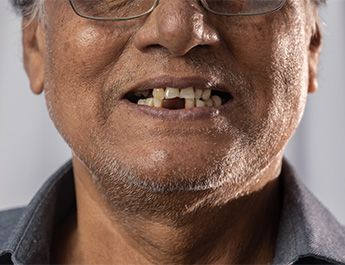
In some cases, particularly if only one tooth is missing toward the back of the mouth, it can seem as though replacement may not be necessary. However, without a full arch of teeth, your biting and chewing capabilities become limited. Nutritious foods are often tough and require strong teeth, which means tooth loss can leave you with more processed, less nutrient-rich foods. As a result, your overall health can suffer!
In addition, gaps in your smile, especially two or more teeth, allow your remaining teeth to drift out of position. When this happens, your bite will change, and larger spaces will develop between your teeth, hurting your aesthetic.
Dentures not only allow you to have a full, cosmetically pleasing smile but also restore essential functions. In other words, they help you overcome the effects of missing teeth and give your smile a second chance.
What Qualifies You for Dentures?

The good news about dentures is that the prerequisites are few. In fact, the only one is that you have a healthy mouth. As long as you don’t have gum disease, cavities, or any other oral issue, you should be good to get these restorations.
If you don’t initially meet this requirement, because of gum disease for example, our team can administer needed treatment and get your mouth in a better position for dentures. Once it is healthy again, we can work on providing your prosthetic teeth.
Alternative Tooth-Replacement Options

Depending on your needs and goals, we may want to explore all your options before jumping right to dentures. For instance, if you have just one tooth missing and a healthy tooth on either side of the gap, perhaps a bridge would be more appropriate than a partial denture. Or, if you would like more permanent tooth replacement, you might want to consider anchoring your dentures to dental implants, which are
Getting a Denture
The process for a traditional denture usually takes about a month. To begin, Dr. Mason will evaluate your smile and determine the best method for replacement. We will take impressions, or molds, of your jaw and any remaining natural teeth. This information is sent along with the specifics outlined in your treatment plan to a trusted laboratory. Here, your denture is crafted from the best materials specifically for your smile.
After your denture has been created, you return to our office to try it on and we make any adjustments as necessary. When everything is just as it should be, we send you on your way with detailed instructions for adjusting to and maintaining your denture. Follow them closely and visit our office for routine follow-up appointments and you’ll be smiling confidently for years to come!
How Dentures Are Made
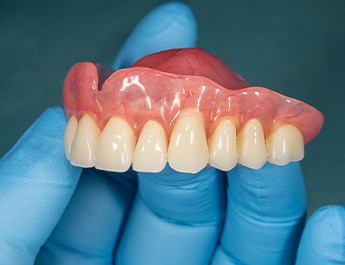
Dentures are a lifechanging tooth replacement option for those who are missing most of or all of their teeth. To achieve a natural-looking, lifelike result, dentures are custom made for each patient. This requires a multistep process that usually takes about a month. Everyone’s treatment looks a little bit different, but here are the main steps that most patients can expect.
What Are Dentures Made Of?
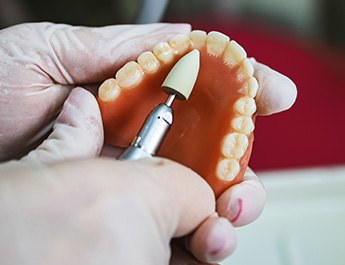
Dentures are comprised of two different parts: the base and the teeth. Here’s what each one is comprised of:
- Base: The base is the foundational structure of the replacement teeth. It can be made from various materials, but acrylic tends to be the most popular since it can be tailored to look just like natural gum tissue.
- Teeth: In most cases, the replacement teeth attached to the base of the denture are made from resin or porcelain. Both of these materials look similar to real tooth enamel. They even reflect light in a similar way.
The Denture Creation Process
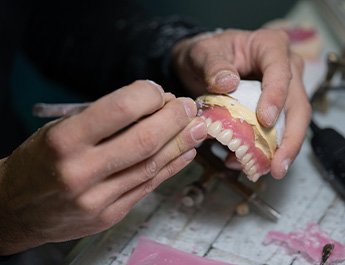
All dentures are customized, so every treatment looks a little bit different. Here are the steps that you can expect:
- Measurements are taken of the jaw, and impressions are taken of the upper and lower gums. These are used to create a plaster model of your mouth.
- The model is sent to the dental lab where your dentures are made. First, your replacement teeth are set in place using an articulator. Then, adjustments are made by the lab technician.
- The wax dentures are sent to your dentist for a fitting. If everything looks and feels good, they are returned to the dental lab to complete the process.
- Once your dentures are back at the lab, the wax needs to be replaced with acrylic. To do this, the lab technician places the dentures into a flask. Plaster is then poured into it to maintain the shape of the dentures. The whole flask is placed in hot water to melt away the wax.
- The plaster is cut from the dentures with dental tools. Then, the dentures are placed in an ultrasonic bath to wash away the remaining plaster.
- Excess acrylic is cut from the dentures. Then, they are polished.
- The dentures are sent back to the dental office.
- If you and your dentist are happy with the final product, you can leave showing off your complete smile.
Adjusting to Your New Dentures

When you first get your new prosthetic, you might notice some soreness and discomfort, but this is perfectly normal as your mouth adjusts. Your dentures will start to feel more natural over time. When you first get your dentures, it’s ideal to stick to a softer diet and exercise your facial muscles. With time, you can introduce tougher foods. If discomfort persists or you have concerns, don’t hesitate to contact us so we can help!
Benefits of Dentures

Living life with dental gaps can be challenging. Some patients are hesitant to smile, while others encounter roadblocks to simple daily tasks like eating or talking. Whether you’re missing all or some of your teeth, dentures can help restore your quality of life by filling out your smile and oral structure. To learn more about how a set of dentures could benefit you, read the information we’ve put together below – and don’t hesitate to contact our office with any questions you might have!
Psychological Benefits

Research shows that the appearance of our teeth greatly affects our mental health. A smile that’s missing teeth can make it difficult for patients to enjoy taking photos with loved ones, open their mouths without thinking about their gaps, or confidently interact with those around them. Other issues, like trouble chewing or speaking clearly, can also impact someone’s self-esteem.
Completing your smile with quality dentures doesn’t just mean restoring your oral health – it means restoring your mental health, too! Nowadays this replacement option can be crafted to fit comfortably and look like real teeth, leaving little room for your mind to doubt their appearance or function.
Clearer Enunciation

The thing about speech is that we pick it up while developing our baby teeth. In other words, pearly whites and proper enunciation go together. If your tongue can’t press up against certain teeth, you’ll have a harder time forming certain sounds. Fortunately, there’s good news for chatterboxes with missing teeth: dentures can provide the structure necessary to talk easily and freely.
Improves Nutrition

Did you know that the chewing process actually helps you absorb nutrition by preparing your food for digestion? It’s strange, but true! Gaps near the front of your mouth can interfere with efficient tearing, however, and gaps near the back will almost certainly make it difficult to effectively break down your meals. A denture replacement can help you enjoy the simple pleasure of good food, as well as make sure you chew well enough to benefit from essential nutrients.
Preserves Oral Health
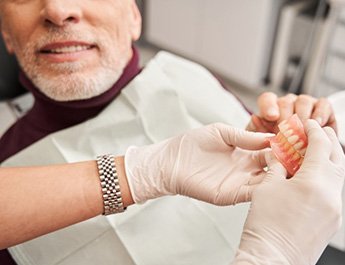
Improving your chewing ability comes with another benefit: saving any remaining teeth you might have from excessive wear and tear. When dental gaps make your bite uneven, physical stress from actions like eating is distributed on some teeth more than others. Dentures will help you avoid all kinds of related problems, like enamel erosion, jaw pain, and diminishing pearly whites.
Expands Opportunity

A beautiful, full smile can make you the center of attention, improving your chances of getting that job you interviewed for, persuading your way to a promotion, or sealing the deal on an important sale. Dentures’ realistic appearance can help you make that crucial, stand-out first impression.
Dentures Aftercare

Take good care of your denture to make sure it lasts for as long as possible. Due to gradual changes in your mouth and normal wear and tear, you’ll need to have your dentures replaced approximately every 5 to 7 years. To keep them in excellent shape, it’s important that you are taking all the proper steps to care for them. Here are some of the ways that you can keep your replacement teeth looking their best!
Remove After Eating

After each of your meals, remove your dentures to rinse them off. This will help to prevent the buildup of food debris, plaque, and harmful bacteria. When you rinse your dentists, make sure that the water isn’t too hot. High temperatures can warm the denture material, causing it to warm and no longer fit properly.
Clean Your Restoration

When it comes time to clean your dentures, use a soft bristled toothbrush and a small amount of unscented hand soap, mild dish soap, or denture cleanser to gently brush them. If you aren’t going to wear your denture again right away, put them in a container of water or denture cleansing solution so they don’t dry out and lose their shape. Remember to always rinse your dentures thoroughly before returning them to your mouth.
Keep Your Dentures Safe
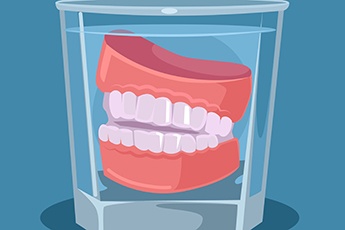
When you clean your dentures, it is ideal to place a towel beneath them in case they slip out of your hands by accident. This reduces the likelihood of them becoming damaged. When you aren’t wearing your dentures, be sure to keep them in a place that is inaccessible to pets and young children.
Remove Dentures When You Sleep

You should take your dentures out at night before you go to sleep. Wearing dentures restrict the circulation of your gum tissue, resulting in soft-tissue irritation. Sleeping with dentures has also been associated with a higher risk of pneumonia and higher levels of gum and tongue plaque. Overnight, keep your dentures in a denture-soaking solution. Don’t let them dry out because they can lose their shape.
Notice Changes

It’s important that you stay on the lookout for changes so you can address them with your dentist. This includes mouth sores, gum irritation, and signs of infection. If your dentures become damaged, you shouldn’t attempt to repair them on your own. You could accidentally cause additional damage. Instead, let us know so we can help.
Understanding the Cost of Dentures

Your smile is unique, which means that your denture must be unique as well! At Mason Dental, we do everything we can to ensure your denture fits as comfortably as possible, looks natural, remains functional for years to come, and of course, is affordable. Keep reading to learn about the most influential factors that determine the final cost of your prosthesis.
Factors that Affect the Cost of Dentures

There are three main considerations to keep in mind when purchasing a denture. First of all, certain preparatory treatments may be needed before a denture can be fitted. This means extractions of existing teeth may need to be performed. Additionally, the type of acrylic used for the base of the denture can also influence the final price tag. This portion is gum-colored so that it blends in with your existing gum tissue. Finally, the replacement teeth are usually made from either an acrylic or porcelain material. It’s very important that the teeth are not only natural-looking, but sturdy.
Are Implant Dentures More Expensive?

The reality is implant dentures are more expensive than traditional dentures because more materials and advanced treatments are necessary to complete them. For starters, implant dentures attach to a series of dental implants that are placed directly into the jaw. This ensures the denture remains more secure, making it less likely to slip or shift out of place when chewing and speaking. Despite the higher price, they are designed to last much longer than traditional dentures, which only last about 5 to 7 years before needing to be replaced. In contrast, dental implants can last 30 years and longer.
Does Dental Insurance Cover Dentures?

Since they are a major procedure, dentures are likely to be covered by dental insurance up to 50%. With that said, every dental plan is different and tends to have different levels of coverage based on which one you use and the provider you receive it from. Our dental team is more than prepared to help patients confirm their specific insurance benefits upfront ahead of treatment, so you know exactly what you’ll be paying in advance.
Dentures FAQs
If you want to quickly regain your complete smile, dentures in Manchester can help! It’s natural to have questions when considering the best way to replace your missing teeth. For your convenience, we’ve gathered a few of the most common questions we get about dentures below so you can learn more about them. As always, if you have more questions, don’t hesitate to give us a call and we’ll be happy to help!
Do Dentures Have to Be Kept in Water?
Your dentures are carefully crafted to ensure they fit comfortably and securely. However, if they dry out, they may warp and lose their precise fit. Whenever your dentures aren’t in your mouth, it’s a good idea to keep them in water to help them maintain their shape. While there are plenty of denture soaking solutions on the market, your safest option is to store them in plain water.
Make sure you don’t use any harsh cleaning chemicals like bleach to disinfect them, since these can weaken them and make you sick. Additionally, you should never expose your dentures to boiling water, which will definitely warp them.
How Many Hours a Day Should I Wear My Dentures?
You probably don’t want to be caught without your teeth, but it’s important that you give your gums time to rest. If your dentures are removable, we recommend taking them out before going to bed and soaking them overnight. This will prevent gum irritation and ensure your dentures are regularly cleaned.
When you first begin wearing dentures, we may encourage you to wear them at night to help your mouth adjust to them. Typically, after about a week, you can start taking them out and soaking them before going to sleep.
Will Wearing Dentures Irritate My Gums?
While dentures of the past were notoriously uncomfortable, modern dental technology and materials have vastly improved dentures over the years. Our custom-made dentures are crafted from high-quality materials that fit securely but comfortably over your gum ridge. However, since jawbone deterioration is a natural part of tooth loss, your mouth will gradually change shape over time. Since your dentures won’t change with the rest of your mouth, they may start to feel loose or uncomfortable.
Wearing poorly-fitting dentures can lead to gum irritation and sores, so if you notice that your new smile isn’t as comfortable as it should be, don’t hesitate to contact us. We’ll either readjust or replace them to alleviate the issue.
How Long Do Dentures Last?
The materials our custom dentures are made of are durable and reliable, but they will inevitably begin to degrade after years of daily wear and tear. Typically, a set of dentures will last between five and seven years before needing to be replaced. However, they may last even longer if you take care of them correctly. To extend the lifespan of your new smile, make sure to:
- Clean your dentures daily with a soft-bristled toothbrush.
- Soak your dentures every night.
- Protect your dentures from heat and harsh chemicals.
- Visit us twice a year for regular checkups.
Questions? Contact Us Today!
If you have questions about your tooth replacement, like whether or not traditional dentures or an implant-retained prosthetic is better for you, please don’t hesitate to get in touch with your restorative dentist in Manchester. We invite you to request an appointment with Dr. Mason today!
